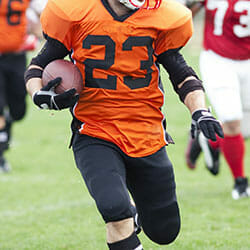
Concussions in Young Athletes
- September 17
- Evans/Reilley
- Personal Injury
In December 2015, Sony Pictures will debut its film, “Concussion,” about the doctor who first identified a degenerative brain disease in professional football players, brought on by repeated head trauma. The disease – Chronic Traumatic Encephalopathy – had long been known to affect amateur and professional boxers, but not until 2002 was it diagnosed in a pro football player.
In news stories about the long-term dangers of concussion, much of the focus has been on professional football. But pro athletes have a long history of playing the game, and it’s possible for a player to suffer one or more head injuries before even reaching adulthood.
How Brain Injury Affects Young People
The human brain isn’t fully developed until a person is about 25 years old, and investigators theorize concussion may affect growing brains differently than it affects mature brains.
The Center for Brain Health at the University of Texas at Dallas has been involved in a long-term study of how brain injury affects young people. Researchers have been following the progress of study participants since 1984 and have found that some children never fully recover from concussion, and an injury to a young brain may increase the risk of long-term cognitive impairment. Up to two years following a concussion, some participants showed higher-level reasoning skills similar to what’s normally seen in children with severe brain injuries.
One rare but often fatal complication of concussions in children is Second Impact Syndrome. If a child has not fully recovered from a concussion and suffers a second blow to the head, rapid and uncontrollable brain swelling may ensue.
Young athletes may try to hide symptoms of concussion so they can continue competing, or they may be unaware they have a concussion, so coaches, physicians, and parents should understand symptoms of concussion and how long a concussed athlete should be prohibited from playing sports.
Symptoms and Safety
Signs of a concussion include memory loss, confusion, agitation, headache, and excessive drowsiness. The Centers for Disease Control and Prevention says athletes experiencing concussion symptoms should be symptom-free for at least 24 hours before returning to play, and they recommend that athletes follow a five-step activity progression in order to return to play, starting with light aerobic activity. It may take days to months to work through the five steps, and at each step of the progression, athletes should be alert to the return of concussion symptoms. A health care provider’s oversight of this rehabilitative process can help ensure that student athletes return to play only when it’s safe to do so.
Incidence of Concussion
An investigative report by KHOU in Dallas found that concussion statistics for Texas high schools are likely inaccurate. According to the report, the University Interscholastic League, which oversees high school athletics, tracks only those concussions that occur during regular-season football. Any concussions that may occur in other sports are not reported, and the UIL policy requires fewer than 20 percent of the state’s public high school football teams to report concussions.
Concussion symptoms may not fully emerge until hours or days after a head injury, but there’s a tool athletic trainers and physicians can use that helps with immediate post-injury concussion assessment: ImPACT baseline testing.
ImPACT performs a series of tests on athletes when they’re healthy. It measures factors such as cognitive abilities and reaction time that establish a baseline for normal brain function. When a trainer or doctor suspects an athlete may have a concussion, they can perform the same ImPACT tests and compare the results to the baseline, to determine to what degree an athlete’s brain function is impaired.
Conservative treatment and heightened awareness about the seriousness of concussions could help protect young athletes from long-term brain function impairment.
If you have questions about how concussion or brain injury might apply to your situation, discuss it with one of the attorneys at the Austin, TX-based Evans Law Firm. As personal injury attorneys with years of experience, we help the people of Texas put their lives back on track. We offer small law firm attention with big law firm results. Call today at 1-855-414-1012 or fill out this online contact form to find out how we can help you.

 Serving Clients Throughout Texas
Serving Clients Throughout Texas
 Chip Evans is a partner at Evans & Herlihy. Chip brings to the firm more than 20 years of experience as a trial lawyer representing Plaintiffs. It is the desire to help individuals, not corporations, that attracts Chip to this side of the docket. [
Chip Evans is a partner at Evans & Herlihy. Chip brings to the firm more than 20 years of experience as a trial lawyer representing Plaintiffs. It is the desire to help individuals, not corporations, that attracts Chip to this side of the docket. [